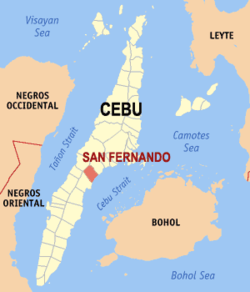San Fernando, Cebu
Apariencia
San Fernando | |
|---|---|
Municipalidad | |
 | |
 Mapa de Cebu con San Fernando resaltado | |
 | |
| Coordenadas: 10°10'N, 123°42'E | |
| Nación | Filipinas |
| Región | Visayas Central (Región VII) |
| Provincia | Cebu |
| Número de barangay | 21 |
| Gobierno | |
| • Type | consejo municipal |
| • Electorado | Error en la secuencia de órdenes: la función «getValue» no existe. votantes (9 Mayo 2022) |
| Superficie | |
| • Total | 69,39 km2 (26,79 sq mi) |
| Elevation | 85 m (279 ft) |
| Populación (1 Mayo 2020) | |
| • Total | 72,224 |
| • Densidad | 1,0/km2 (2,7/sq mi) |
| • Hogares | 16,555 |
| Economía | |
| • Clase de ingresos | el segunda clase de municipalidad |
| • Incidencia de la pobreza | Error en la secuencia de órdenes: la función «getValue» no existe.% (Error: fecha y hora no válidas.)[2] |
| • Ingresos | ₱ <strong4a4df3e5">Error (Error: fecha y hora no válidas.) |
| • Activos | ₱ <strong4a4df3e5">Error (Error: fecha y hora no válidas.) |
| • Pasivos | ₱ <strong4a4df3e5">Error (Error: fecha y hora no válidas.) |
| • Gastos | ₱ <strong4a4df3e5">Error (Error: fecha y hora no válidas.) |
| Huso horario | UTC+8 (PST) |
| Código postal | 6018 |
| PSGC | |
| Código telefonico | 32 |
| Lenguaje nativo | Cebuano Tagalog |
San Fernando el segunda clase de municipalidad na provincia de Cebu, Filipinas. Tiene este zona de 69.39 kilometro cuadrado.
Comporme del 1 Mayo 2020 censo este tiene papulidad de 72,224 personas y 16,555 hogares. El designada codigo postal 6018 y PSGC 072241000.
Barangay
[revisa | revisa codigo]
|
|
Demografía
[revisa | revisa codigo]| Año | Populación | ±% p.a. |
|---|---|---|
| 1903 | 15 451 | — |
| 1918 | 20 029 | +1.75% |
| 1939 | 17 562 | −0.62% |
| 1948 | 16 132 | −0.94% |
| 1960 | 19 061 | +1.40% |
| 1970 | 24 073 | +2.36% |
| 1975 | 25 877 | +1.46% |
| 1980 | 28 324 | +1.82% |
| 1990 | 35 051 | +2.15% |
| 1995 | 38 700 | +1.87% |
| 2000 | 48 235 | +4.83% |
| 2007 | 54 932 | +1.81% |
| 2010 | 60 970 | +3.87% |
| 2015 | 66 280 | +1.60% |
| 2020 | 72 224 | +1.70% |
| Ref: Autoridad de Estadísticas de Filipinas[3][4][5][6] | ||
Referencias
[revisa | revisa codigo]- ↑ «Province: Cebu». PSGC Interactive. Quezon City, Philippines: Philippine Statistics Authority. Consultado el Diciembre 17, 2016.
- ↑ «PSA Releases the 2021 City and Municipal Level Poverty Estimates» (2 Abril 2024).
- ↑ Census of Population (2015). "Region VII (Central Visayas)". Total Population by Province, City, Municipality and Barangay. Philippine Statistics Authority.
- ↑ Census of Population and Housing (2010). "Region VII (Central Visayas)". Total Population by Province, City, Municipality and Barangay. NSO.
- ↑ Censuses of Population (1903–2007). "Region VII (Central Visayas)". Table 1. Population Enumerated in Various Censuses by Province/Highly Urbanized City: 1903 to 2007. NSO.
- ↑ «Province of Cebu». Municipality Population Data. Local Water Utilities Administration Research Division. Consultado el Diciembre 17, 2016.
Enlaces externos
[revisa | revisa codigo]| Ciudad de Cebu (cabecera) | |
| Municipalidad: | Alcantara ▪ Alcoy ▪ Alegria ▪ Aloguinsan ▪ Argao ▪ Asturias ▪ Badian ▪ Balamban ▪ Bantayan ▪ Barili ▪ Boljoon ▪ Borbon ▪ Carmen ▪ Catmon ▪ Compostela ▪ Consolacion ▪ Cordova ▪ Daanbantayan ▪ Dalaguete ▪ Dumanjug ▪ Ginatilan ▪ Liloan ▪ Madridejos ▪ Malabuyoc ▪ Medellin ▪ Minglanilla ▪ Moalboal ▪ Oslob ▪ Pilar ▪ Pinamungajan ▪ Poro ▪ Ronda ▪ Samboan ▪ San Fernando ▪ San Francisco ▪ San Remigio ▪ Santa Fe ▪ Santander ▪ Sibonga ▪ Sogod ▪ Tabogon ▪ Tabuelan ▪ Tuburan ▪ Tudela |
| Ciudad: | Ciudad de Cebu ▪ Ciudad de Lapu-Lapu ▪ Mandaue ▪ Bogo ▪ Carcar ▪ Dánao ▪ Naga ▪ Talisay ▪ Toledo |


